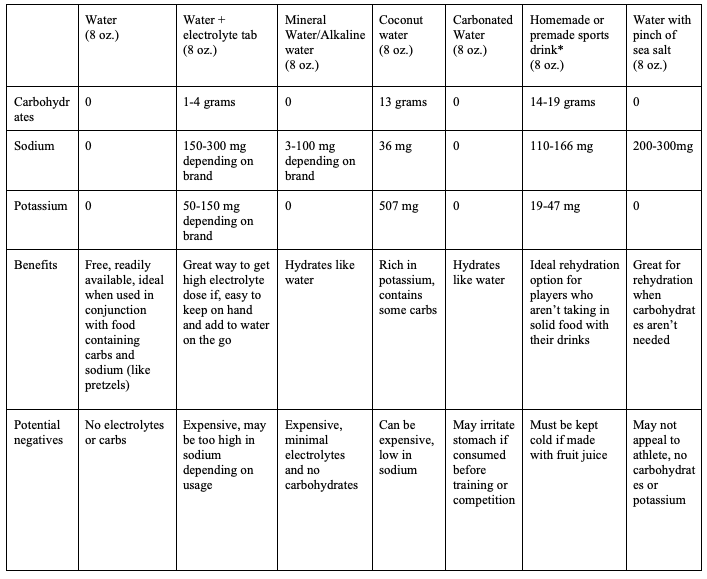Biz Tips
Are there benefits to using enriched water?
By TrueSport
By TrueSport
Alkaline water, mineral water, carbonated water, coconut water: There are so many different water options available that it can feel a bit overwhelming at the grocery store. Which one will serve your athlete best, or is plain old tap water the optimal solution?
Here, TrueSport Expert Stephanie Miezin, MS, RD, CSSD, explains the difference between different types of enriched waters—including the role of sports drinks—and discusses how you can determine the best option for your athlete.
Sports drink versus enriched water
In general, when we talk about water, we're talking about water with minimal (if any) calories added. Electrolytes may be included. Sports drinks usually refer to caloric beverages that contain not only critical carbohydrates, but electrolytes like sodium and potassium as well. These electrolytes are crucial to rehydration: Especially in hot, humid weather or after extreme exertion, water alone may not be enough to adequately rehydrate your athlete.
Label confusion
Some waters may sound sport-ready: alkaline water and mineral water both seem like they'd contain vital electrolytes to help your athlete excel on the playing field. But neither beverage contains more than trace minerals, and will work only as well as regular water, just with a higher price tag.
"Alkaline water is just a marketing ploy," says Miezin. "Our bodies are perfectly capable of staying at the proper pH without help from alkaline water—we have natural mechanisms for that, and if you were to get out of balance, you'd probably be in the hospital."
On the other side of the spectrum, coconut water may sound like simple flavored water, but it actually contains carbohydrates and some electrolytes.
Avoid energy drinks
Above all, Miezin discourages parents from buying any 'energy drinks' for young athletes. Energy drinks are designed for adults, and that level of caffeine may not be healthy for teens or children. Energy drinks often are very high in sugars and stimulants that make these drinks generally not a good option for young athletes. Additionally, excess caffeine found in many energy drinks may be dehydrating, potentially exacerbating the effects of heat and humidity.
Plain water works well when snacking
Remember, carbohydrates and electrolytes can also be delivered via whole foods. "A handful of pretzels adds carbohydrates and a good dose of sodium, so that's great with plain water," says Miezin. If your athlete is going to be snacking before or during practice, plain water is just fine.
What to look for:
An ideal sports drink for both rehydration and carbohydrate energy should have 14-19 grams of carbs, 110-166 mg sodium, and 19-47 mg potassium per 8-ounce serving, says Miezin. However, carbohydrates aren't always required. If an athlete is playing for under an hour, they likely don't need the added sugars to perform, and water, or water with electrolytes or a pinch of sea salt, could do the trick to support hydration needs.
When buying water or sports drinks, check the labels carefully. Some electrolyte tabs, for example, are meant to be used in a 16-fluid ounce water bottle, while some show serving sizes for 8 ounces.
Here, we've put together a handy comparison chart to take some of the confusion out of water shopping. But remember, it's important to check individual brand labels as you shop, since some coconut waters will contain less sodium than others, and a homemade sports drink's carbohydrates and potassium will vary based on the fruit juice that you select.

Click for a larger version
For the homemade sports drink, try this simple recipe that yields five servings (8 ounces each):
- 4-1/4 cups water
- 1/2 cup 100% orange or other fruit juice
- 4-1/2 tbs. granulated sugar
- 1/2 tsp. kosher/sea salt
Takeaway
Make sure that your athlete is taking in some form of water, electrolytes (especially sodium), and carbohydrates before and during sports practice, especially for practices over an hour. Check labels carefully, since some products may sound more compelling than they are in reality.
About TrueSport
TrueSport®, a movement powered by the experience and values of the U.S. Anti-Doping Agency, champions the positive values and life lessons learned through youth sport. TrueSport inspires athletes, coaches, parents, and administrators to change the culture of youth sport through active engagement and thoughtful curriculum based on cornerstone lessons of sportsmanship, character-building, and clean and healthy performance, while also creating leaders across communities through sport.
For more expert-driven articles and materials, visit TrueSport’s comprehensive LEARN resource.
This content was reproduced in partnership with TrueSport. Any content copied or reproduced without TrueSport and the U.S. Anti-Doping Agency’s express written permission would be in violation of our copyright, and subject to legal recourse. To learn more or request permission to reproduce content, click here.


